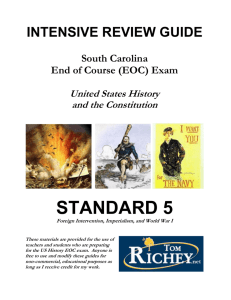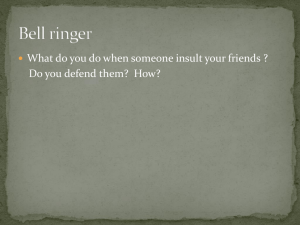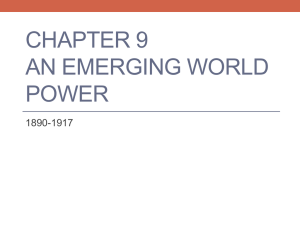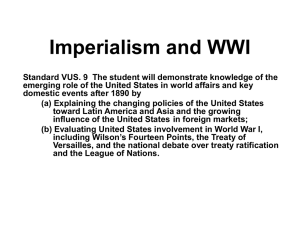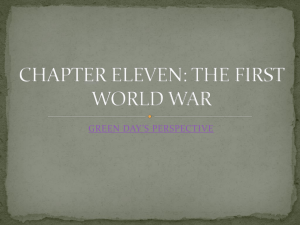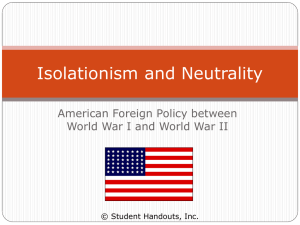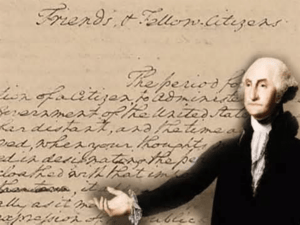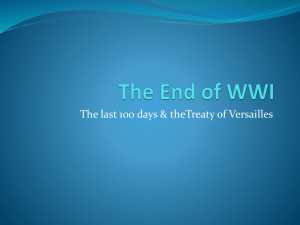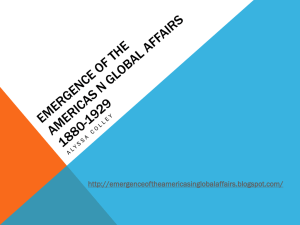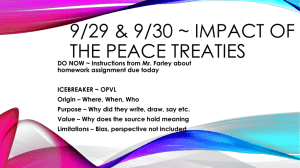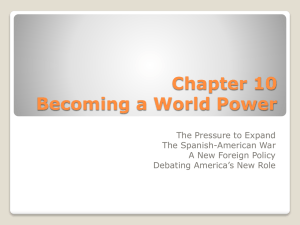Standard 5 Notes
advertisement
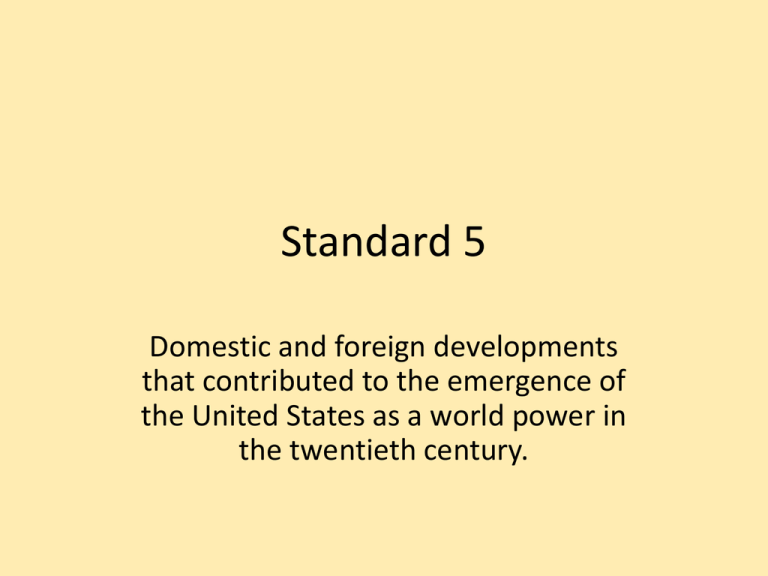
Standard 5 Domestic and foreign developments that contributed to the emergence of the United States as a world power in the twentieth century. Day 1 Wednesday 5.1 • American expansionism – Isolationism – Intervention • Imperialism – Social Darwinism – Capitalism – Domestic issues 4 slides Imperialism • Historically, the US focused on domestic issues instead of international affairs • Previous expansion was motivated by land hunger • Expansion in the late 19th c. went beyond land in search of new markets • Imperialism- stronger nations extend their economic, political, or military control over weaker territories Imperialism • The US moved from isolationism to intervention because of expanding capitalism – Increased the need for raw materials and new markets • Trading overseas would increased demand for US manufactured goods – Led to increased farm production Imperialism • Growing nationalism fostered the desire to expand American naval power in order to compete with other imperialist nations – Protect trade – Secure markets – Spread Christianity Imperialism • Social Darwinism encouraged the idea that Americans were superior to other cultures – Must expand to fulfill the nation’s destiny • Expansionism led the US to spread American ideas, religious beliefs, and capitalism to other nations – It also initiated foreign resentment of American interference Day 2 Thursday 5.2 • Spanish American War – Yellow journalism – South Pacific – Pro- and anti-imperialists 5 slides Spanish American War • US involvement in the Spanish American War marked America’s emergence as a world power – The US sympathized with the democratic aspirations of the oppressed Cubans – Desire for new markets and expanding capitalism – Expansion of naval power – Yellow journalism sensationalized events in Cuba (USS Maine and DeLome letter) • President McKinley was pressured to ask Congress to declare war Spanish American War • The US annexed Hawaii and captured Manila Harbor (Philippines) immediately after the war declaration – Offered a convenient fueling stop on the way to markets in Asia • After the war, Americans were against annexing the Philippines because they would never be fully incorporated into the Union – McKinley believed it was America’s responsibility to govern the Filipinos who could not govern themselves Spanish American War • Social Darwinism and racial prejudices influenced both Pro- and Anti-Imperialists • Domestic prejudices manifested through Jim Crow Laws and voting restrictions Spanish American War • After the Spanish American War, the US gained territory in the Caribbean and the Pacific – – – – The Philippines Wake Island Guam Puerto Rico • The Platt Amendment declared the US a protectorate of Cuba, controlling economic and political influences • The debate of how to govern these areas was heighted when Filipinos started revolting against the US Spanish American War • The SCOTUS ruled that the “Constitution does not follow the flag” – Subject peoples do not have the same rights as citizens of the US – These lands were not offered statehood • Subject peoples saw the US as a colonial power, not the champion of liberty Day 3 Friday 5.3 6 slides • US foreign policy in the early 20th century – Open Door policy – Panama Revolution – Roosevelt’s “big stick diplomacy” – Taft’s “dollar diplomacy” – Wilson’s “moral diplomacy” – Changing world perceptions Imperialism • America changed form isolationism to imperialism based on the need for new markets • Chinese and Latin American policy became more assertive Influence in China • European nations had trading privileges with China called ‘spheres of influence’ • In its Open Door Policy, the US asked that all foreign powers have equal opportunity to trade – Great Britain supported the Open Door Policy (much like they supported the Monroe Doctrine) • Chinese nationalists called the “Boxers” resisted foreign involvement but were put down by the US and British during the Boxer Rebellion Influence in Latin America • US involvement in Latin America increased after the Spanish American War • The Platt Amendment in the Cuban constitution extended US supervision over Cuban affairs and granted the right to lease a military base at Guantanamo Bay Influence in Latin America • US imperialism in Latin America manifested during the Panama Revolution • The US supported the Panamanians in their revolt against the Colombian government – In return, Panama agreed to give the US exclusive rights to build a canal • This allowed the US to gain influence over the region for almost a century – Alienated Colombia (and later Panama) Presidential Diplomacy • Theodore Roosevelt’s Corollary to the Monroe Doctrine described the US as the police of the Western Hemisphere • Roosevelt’s “Big Stick” diplomacy increased the US profile in world affairs • William H. Taft’s “Dollar” diplomacy promised to protect US economic and business investments in Latin America Presidential Diplomacy • Woodrow Wilson’s “Moral” diplomacy was used to ‘teach the Mexicans to elect good men’ while supporting US businessmen • Each president’s policy involved the US more deeply in the Western Hemisphere, angered US neighbors, and increased the US’ role in world affairs Day 4 Monday 5.4 12 slides • Causes and consequences of US involvement in World War I – Neutrality – Declaration of war – Propaganda – Individual liberties – Treaty of Versailles – League of Nations Nationalism and Alliances • ‘Nation’ refers to a group of people who share a common language, religion, history and traditions – Not all nations had states – Many were included in empires • Ethnic and ideological differences led to conflict within these empires • Nationalism promoted competition in military strength and led to military alliances Start of World War I • The assassination of Archduke Franz Ferdinand, heir to the Austro-Hungarian Empire, in Bosnia by a Serbian nationalist sparked the start of the Great War – Serbian nationalists were revolting against the imperialistic control of the Austro-Hungarian Empire • The confrontation between Serbia and Austria-Hungary quickly involved much of Europe due to the alliance system US Neutrality • The US initially declared neutrality at the start of WWI but European actions caused it to fail – Trade – Submarines – Mexico US Neutrality: Trade • US utilized its traditional trading ties with GB • British blockades of German ports limited American trade with Germany • US businesses loaned money to the Allies to promote trade US Neutrality: Submarine Warfare • Germany’s use of unrestricted submarine warfare affected US public opinion on the War • The 1915 German U-boat’s sinking of the Lusitania outraged President Wilson and the American public – Lusitania- British passenger ship which had Americans on board • Germany pledged to restrict their use of submarine warfare US Neutrality: Mexico • Wilson was re-elected in 1916 on the slogan “he kept us out of war” • GB intercepted and published a telegram from Germany to Mexico – Zimmerman note- Germany asked Mexico to declare war on the US and after the war, Mexico would regain their lost territory • Americans were outraged because this would have violated their neutrality Declaration of War • Germany resumed unrestricted submarine warfare in Spring 1917 • Wilson asked Congress to declare war in April 1917 – “make the world safe for democracy” – Fourteen Points peace plan to achieve a “just and lasting peace” • • • • • Freedom of the seas End to secret treaties Arms reduction Self-determination International peace organization End of World War I • Due to American involvement, Germany’s last push on the Western front in France was deflected • The armistice started on Nov. 11, 1918 – Ended the fighting between the Allies and the Central Powers Day 5 Tuesday Propaganda • Propaganda created a united war effort – – – – – – – – Planted victory gardens Enlisted in the military Bought war bonds Characterized German’s as “Huns” Resulted in discrimination against German Americans Stopped teaching German in schools Restricted the playing of German music Renamed German foods Propaganda • The Sedition Act restricted the individual liberties of Americans – Couldn’t voice their ideological objections to the war effort – Contributed to the post-war Red Scare (fear of communism) Peace Treaty • President Wilson wanted a peace settlement based on his Fourteen Points • Other allies were determined to protect their own national interests • Treaty of Versailles – – – – War Guilt Clause Reparations Demilitarization New national boarders based on self-determination • The harsh terms of the treaty laid the bases for WW2 Peace Treaty • The League of Nations would act as a discussion board for member nations – Created to prevent secret alliances – Promoted diplomacy instead of war declaration 5.5 3 slides • US rejection of internationalism – Postwar disillusionment – Treaty of Versailles – Election of 1920 – 1920s International Affairs US Treaty with Germany • The US Constitution grants the executive branch power over foreign policy – Check and balances requires the Senate to ratify all treaties • President Wilson took a central role in the Treaty of Versailles and wanted the US to play a leading role in the League of Nations – The Senate refused to ratify the treaty because of fears it would bring the US into future conflicts • The US made a separate peace with Germany US Treaty with Germany • The US never joined the League but did send observers to the meetings • The US joined other nations in the call for limiting the size of navies • The US loaned money to Germany so they could pay war reparations to France and GB then those nations could pay off loans to the US – Dawes Plan- $800 million – Young Plan- Reduced reparation amount from 269 billion gold marks to 112 billion ($8 billion USD) US Isolationism • The US did not intervene in European affairs when dictators rose to power in Italy and Germany during the 1920s and 1930s • When the Great Depression started in 1929, Americans were too concerned with domestic problems to worry about European issues • The Neutrality Acts were passed to keep the US out of any future war
